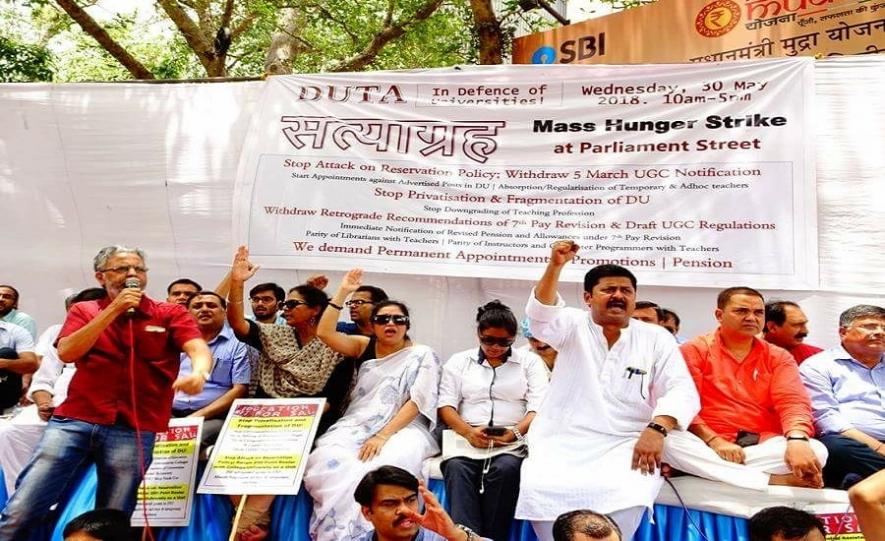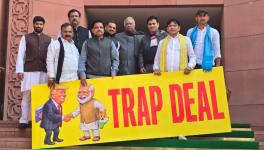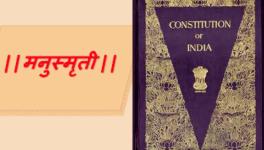Indian Campuses Under Siege

Image Courtesy: Caravan Daily
The past four to five years, in particular, have seen the entire university and campus scene rocked by multiple attacks on the democratic space, reducing learning, scientific temper, student democracy and dissent to a farce. There is increasing intolerance, harassment of students and teachers, with the current regime ensuring a systematically planned erosion of the public education.
The release of a report in Delhi this Tuesday, titled “Indian Campuses Under Siege” by the People’s Tribunal on Attacks on Educational Institutions ‘is a pointer to what is happening in the campuses across the country. The report is the culmination of a two-day open dialogue last year, with many witnesses, in the presence of the tribunal’s members.
The report records the emerging trends in educational institutions and the crisis faced in education and is even more relevant in the context of the increased criminalisation and marginalisation of students in the past few years. It may be noted that in the face of increasing attacks on democratic space, including in higher education institutions, students’ bodies, teachers and civil rights activists, a number of civil society organisations came together to form the People’s Commission on Shrinking Democratic Space (PCSDS) in 2016. It held its first People's Tribunal on Attacks on Educational Institutions in India from April11-13, 2018.
The report includes 130 testimonies of students and faculty from close to 50 institutions and universities across 17 states in the country, of which 49 oral depositions were presented before a jury panel of eminent persons comprising Justice (Retd.) Hosbet Suresh, Justice (Retd.) BG Kolse Patil, Prof. Amit Bhaduri, Dr. Uma Chakravarty, Prof. TK Oommen, Prof. Vasanthi Devi, Prof. Ghanshyam Shah, Prof. Meher Engineer, Prof. Kalpana Kannabiran and Ms. Pamela Philipose.
The experts also made submissions before the jury on the thematic areas -- the impact of privatisation and globalisation of education, distortion of history and syllabus and saffronisation of education, student unions and elections on campuses, criminalisation of dissent and structural marginalisation in educational institutions based on caste, gender and sexuality, region and religion. On the last day of the tribunal, an interim report was released by the jury, comprising their observations and findings based on these depositions.
In the final report, the jury concludes that there has indeed been a systematic onslaught on the very idea of higher education in India. The jury observed that the extreme and manifold crisis in higher education, which has grown over the last few decades in India, has got accentuated in the four years under the current regime. This is deliberate, since an educated citizenry can pose questions to those who rule and is essential for deepening of democracy. Hence, the crisis is not simply a crisis of education alone, but of society as a whole.
Through the testimonies on privatisation and globalisation of education, the issues of withdrawal of the government from funding education, fee hikes, removal of financial aid to Scheduled Caste and Tribes and Other Backward Class students and consequently, the denial of education to students from marginalised communities, granting autonomy to universities, self-financing courses, removal of scholarships and delays in scholarship and fellowship payments, centralisation of admission process, the condition of state universities and colleges, among several other common and unique issues plaguing the higher education institutions in different parts of the country.
Distortion of History
Depositions on distortion of history and syllabus and saffronisation of education reveal the deepening presence of Hindutva forces in campuses and the loss of independence of institutions responsible for curriculum building. Some depositions record the spread of communalisation and saffronisation and an attempt to take India back to the dark ages or to a new era of jingoism.
The report also highlights the dismal state of autonomy in universities under the current regime on account of the takeover of campuses and by placing loyalists in key positions, as also the suppression of dissenting voices. The testimonies point out how the whole process of elections is being undermined and influenced in favour of student organisations, like the Rashtriya Swayamsevak Sangh-backed Akhil Bharatiya Vidyarthi Parishad (ABVP). The repression faced by student unions and associations and the farcial process of conducting student elections is one of the major concerns, the report said.
One of the major trends that the testimonies reveal is the increase in crackdown on
dissent and criminalisation of students in campuses across the country. Testimonies of extreme reprisals were received from Film and Television Institute, Jawarharlal Nehru University, Hyderabad Central University, Delhi University, Jadavpur University, Allahabad University, Lucknow University, among others. A startling increase in the use of sedition law, unlawful activities, rioting, arson to curb dissent has also been seen.
Students also presented accounts of marginalisation faced by them on Indian campuses on the basis of caste, gender and sexuality, language, region and religion. The increase in anti-SC/ST policies under the current dispensation has led to insecurity and increased marginalisation of students from these communities, and their protests are met with severe reprisals. Students challenging gender discrimination and sexism on campuses said they were similarly targeted.
Meanwhile, educational institutions have, by and large, failed to implement the legal provisions and policies in sexual harassment cases reported on campuses. Students for the Northeast and Kashmir reported their ‘othering’ and marginalisation. In the atmosphere of takeover of some institutions by Hindutva forces, Muslim students said they were being targeted and vilified publicly, as communalism is on the rise in campuses as well as society.
In her inaugural speech on the release of the report, senior journalist Pamela Philipose read out some excerpts from reports’ findings that showed how over the years the democratic space for which the former generation fought so hard has been continuously shrinking, particularly under the present regime.
Prof. Apoorvanand, in his address, stressed the increasing degeneration in education which, according to him, should not be termed ‘saffronisation’ but “ghatiyakaran” (degeneration) of education, The spirit of enquiry is systematically being killed, he said, adding that dissent in any form was being termed “anti-national”.
Journalist Amit Sengupta lamented how in every field questioning was being throttled and those who questioned were being banished from the profession.
Uma Chakravarty, a well known academician, narrated how in the mid-1970s, the teachers fought for and achieved democratisation of the academic system in the university, how the history syllabus was thoroughly revised by a panel of university teachers, how each of them went through each of the readings introduced and then after thorough deliberation the syllabus was structured. This was later was followed by a number of universities. Whereas the unprepared introduction of the semester system in the university today was just eliminating certain readings and cutting the syllabus into half, thus depriving the students of any proper knowledge, she said.
With the elections 2019 in the final stages, it would be wise for the authorities concerned to pay heed to some of the recommendations of the report to save educational institutions from attempts being made to turn the clock back.
The writer is a senior journalist. The views are personal.
Get the latest reports & analysis with people's perspective on Protests, movements & deep analytical videos, discussions of the current affairs in your Telegram app. Subscribe to NewsClick's Telegram channel & get Real-Time updates on stories, as they get published on our website.























